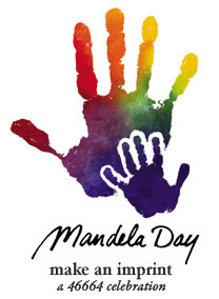
July 27, 2009 – The following piece, written by Mac Maharaj, originally appeared on The Times website on July 25, 2009, and has been published here with permission from The Times, South Africa.
Mandela Day was greeted with a flood of enthusiasm in South Africa and throughout the world, with individuals and groups going out to serve the orphaned, aged, ill and infirm.
The significance of their actions went beyond the meal served, garden tended, toilet repaired and blanket provided. Their actions carried the message: “We care for you. You are part of us.”
It was amazing how small acts of kindness became towering acknowledgments of the dignity of those who, for so long, have been consigned to the margins of our society.
As I listened to reports of small and large acts of serving communities, I got a sense that, by design or otherwise, we had unleashed a powerful energy in our people.
For years I feared we had missed the 1994 boat — that moment to galvanise our people to bring every talent and skill to the service of building a nation founded on reconstruction and reconciliation without asking: “What is in it for me?”
Now I began to feel that the response to Mandela Day gives us another chance to reach out against the divides of social, economic and political constructs to join hands and act in concert to continuously change the material and spiritual quality of our lives.
This is not a matter of creating a new organisation, electing leaders or mapping out new directions. To do this will import all the negatives of politicking and point scoring that characterise our current state of affairs.
A brainchild of the Nelson Mandela Foundation and the 46664 campaign, Mandela Day tapped into the energy of our people when President Jacob Zuma embraced it and called for its support in his state of the nation address.
The power unleashed belongs not to some grand plan, but to the gathering of small efforts. It emerged from the growing sense that each effort was a little stream feeding into a mighty river. It allowed people to develop an understanding that they could make a difference. It opened up the potential for ingenuity and self-organisation.
We must avoid constricting this kind of space. I would urge the Nelson Mandela Foundation to gather evidence of all these efforts continuously, not only those made on Mandela Day, and to disseminate it to the public regularly so that we learn from each other’s efforts and feel the surge of people in action. In this way, acts of giving, receiving, service and self-help will make the annual Mandela Day live in our everyday actions.
People need the maximum space to take charge of their lives and break out of the cycle of helplessness and despair.
It is time for leaders and activists of all political parties, trade unions, business organisations, as well as cultural, sporting and religious associations to mobilise their supporters to become part of this national effort that cuts across partisan interests.
None of this detracts from the fact that poverty, joblessness, homelessness, lack of education, health and sanitation and so on are a gross denial of one’s dignity and need to be attended to by the government, business, labour and civil society within the framework of our democracy.
The potential manifest in Mandela Day is belief in the capacity of people, as individuals and as communities, to shape their destiny. It is an empowering idea that rests on us acting in unity, even as we pursue our separate interests, thereby ensuring that by upholding and defending the dignity of others you enhance your own dignity.
That, after all, is what Madiba’s life has been about. That is why, in reflecting on his life in prison, he wrote that “Prison and the authorities conspire to rob each man of his dignity. In and of itself, that assured that I would survive, for any man or institution that tries to rob me of my dignity will lose because I will not part with it at any price or under any presence ... I am fundamentally an optimist ... Part of being an optimist is keeping one’s head pointed towards the sun, one’s feet moving forward ...”
There were times when it appeared that there was a greater interest in rubbishing Mandela’s legacy than building on it. The activities of Mandela Day have demonstrated that Madiba has become the embodiment of an idea that transcends his physical being. Last Saturday showed that when an idea takes hold, it becomes indestructible.
The challenge is how to continuously open spaces that allow individuals, communities and our nation to grasp their destinies in their own hands and, while welcoming the support and services of others, take charge of their fragmented and traumatised lives — even in the middle of poverty and want.